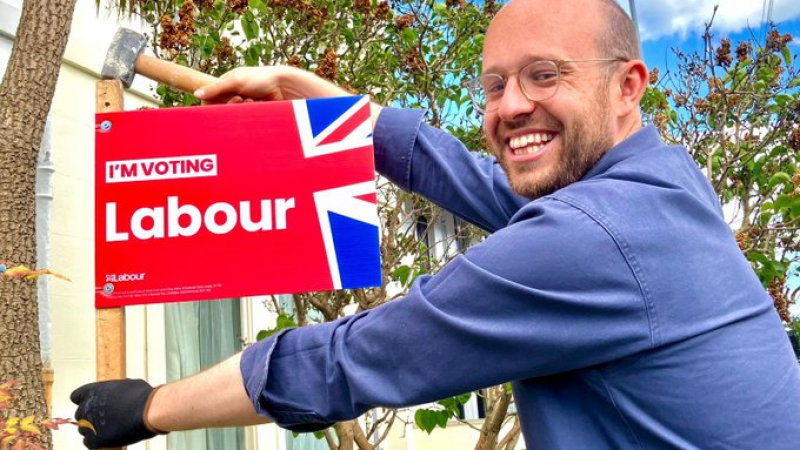
Back in December, the Labour Party published a list of what it then viewed as “non-battleground” seats in the coming general election.
The much-discussed list was seized upon by the Liberal Democrats in some areas to claim that Labour had ‘given up’ on the constituencies listed.
It includes 41 of south-west England’s 58 seats, feeding into assumptions about a ‘true blue’ South West where the Lib Dems are the main challenger to the Tories.
But polling suggests some of the seats on the list are very much in contention for Labour – including in the South West. The party’s own strategy also appears to have somewhat shifted, with LabourList revealing earlier this month that 11 of the 211 seats are now listed on the party’s volunteer website as “battleground areas”.
READ MORE: Sign up to our must-read daily briefing email on all things Labour
LabourList visited three seats in the South West that polling suggests could be winnable for Labour despite them (at least initially) being categorised as non-battlegrounds.
Two – North East Somerset and Hanham and Weston-super-Mare – are among the 11 now classed as “battleground areas”, while Labour’s volunteer website was recommending recently that members in the third, South Dorset, travel to other seats to campaign. Here’s what the party’s candidates in the seats had to tell us.
‘Right and proper that campaigns have to prioritise resources’
“It’s only right and proper that all campaigns have to prioritise resources. The Labour Party’s doing that,” Lloyd Hatton, Labour’s candidate in South Dorset, tells me when I ask him about the seat’s categorisation as a ‘non-battleground’.
Chatting after a sunny evening canvass on the edge of the constituency, Hatton denies any local unhappiness about the seat – which was held by Labour from 2001 to 2010 – being identified in this way, describing the mood in the local party as the “most upbeat it’s been for a really long time”. The seat has been represented by Tory Richard Drax since the 2010 election, whose most recent majority was 17,153 votes.
READ MORE: ‘Does Labour’s poll dip signal a Green and Lib Dem revival?’
Hatton – who is a councillor in London but was born and grew up in the constituency – is regularly campaigning in the nearby target seat of Bournemouth West and claims it has not been difficult to get people to help out in the other constituency. He thinks Labour could win in both Bournemouth and his own seat, stressing that he does not see those results as “mutually exclusive”.
‘I understand the strategy – it’s bigger than a single constituency’
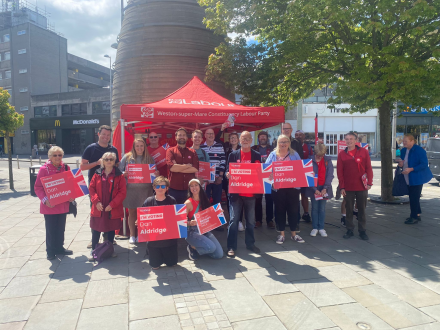
Dan Aldridge – Labour’s candidate in Weston-super-Mare – also voices support for Labour’s strategy. “This is about winning a general election, not just about winning Weston,” he tells me over coffee after a marathon canvassing session in the Worle area of the seat. “Winning Weston is amazing if we can do it. But I totally understand the strategy, because it’s bigger than the single constituency.”
He says he and the local party understood “at the beginning, it was probably a long shot”; the seat has never elected a Labour MP before and has been represented by Tory John Penrose since 2005.
Aldridge describes the relationship between region, the national party and the local party as “really positive, fruitful [and] respectful”, though he suggests there had been some difficulty motivating all members to campaign elsewhere when they were still recommended to do so.
READ MORE: UK general election poll tracker: Daily roundup on how polls look for Labour
Dan Norris – the current mayor of the West of England who is seeking to return to Westminster as the MP for North East Somerset and Hanham – says his seat now being designated as a ‘battleground area’ is “helpful”.
He tells me there has been “no shortage of volunteers or enthusiasm or energy”, though he attributes this to the high profile nature of the contest, which sees him pitted against the former cabinet minister Jacob Rees-Mogg, the man who unseated him back in 2010.
‘True blue’ Tory generalisation ‘doesn’t stand up to scrutiny’
Norris dismisses generalisations about the South West being ‘true blue’ Tory and the Lib Dems being the natural challengers, telling me: “It doesn’t stand up to scrutiny.” We speak over tea and coffee in the living room of a local activist, surrounded by neatly organised piles of leaflets.
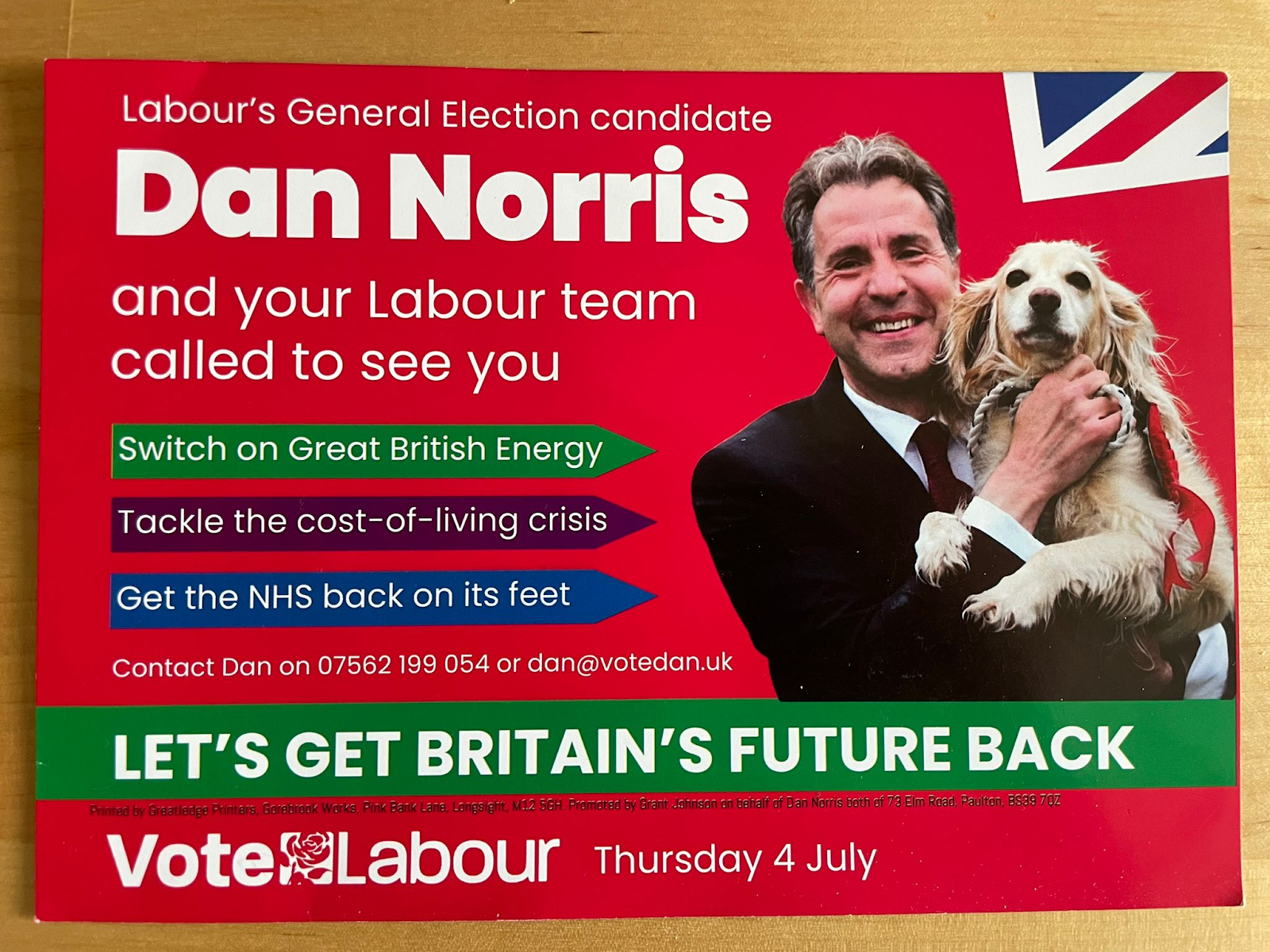
Norris – who was MP for Wansdyke from 1997 to 2010, the predecessor seat to the predecessor seat of the seat he is currently contesting – notes the importance of governments being “able to represent all communities”, and sees himself as a good example from when Labour was last in government.
READ MORE: Tactical voting website says vote Labour in Bristol Central and Sheffield Hallam
“We have to represent all walks of life and all backgrounds and all experiences to be a credible government… In order to do that, we will win some seats that are semi-rural and very rural. And it looks to me, based on the anger that I’m experiencing from what farmers are telling me and have been telling me, that that is likely to happen again.”
‘Every county has the possibility to have a Labour MP’
Hatton also rejects such stereotypes about the South West as a “gross simplification”, highlighting long-serving Labour MP for Exeter Ben Bradshaw.
“Every county has the possibility to have a Labour MP by the end of this,” he argues. “I think there’s always a sizeable bit of the South West that goes Labour, and you write it off at your own peril.”
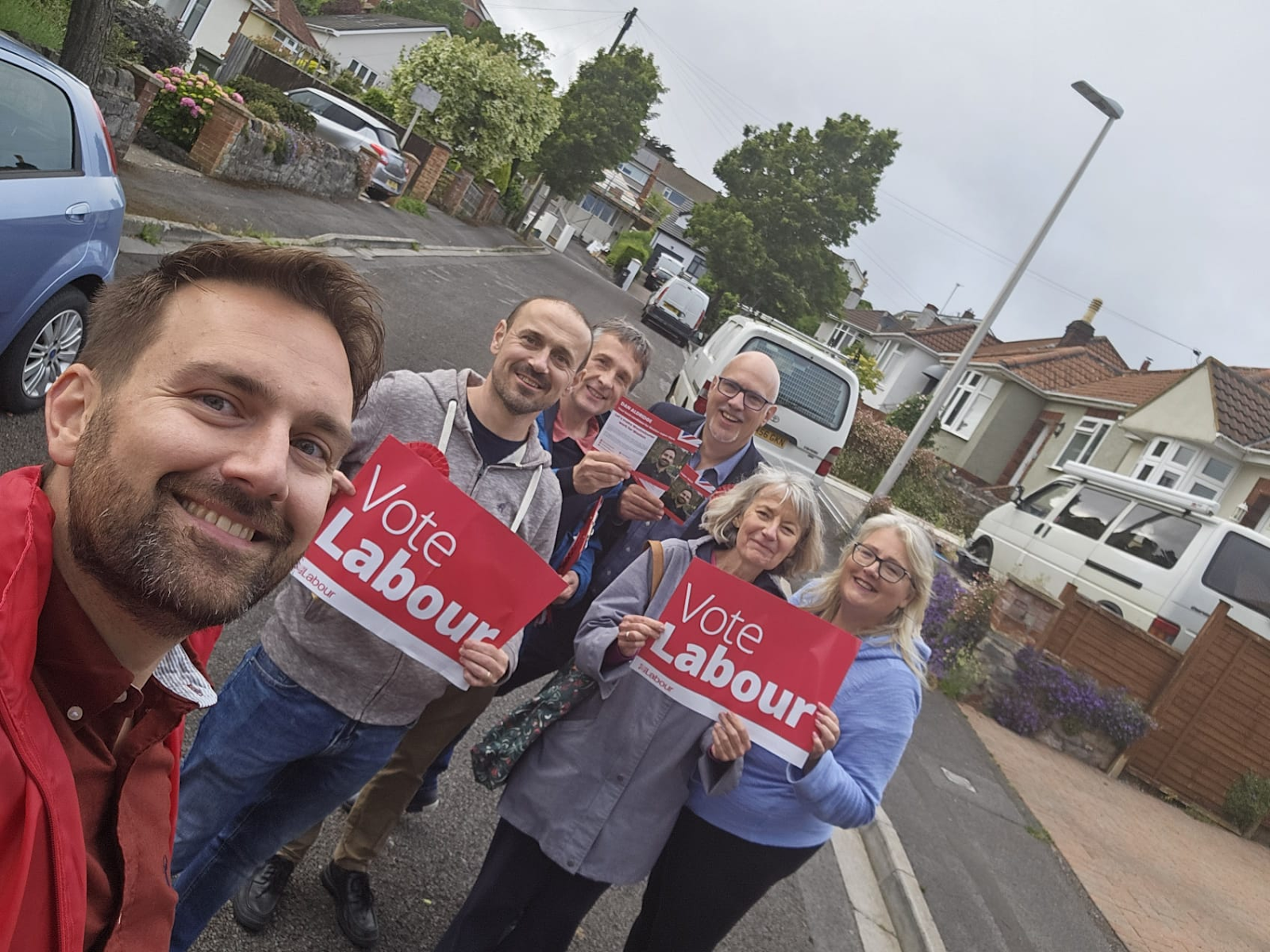
All three candidates claim the local Lib Dem campaigns have been fairly muted. Hatton describes their campaign in South Dorset as “pretty minor”, while Aldridge says the party is “not particularly visible” in Weston-super-Mare.
READ MORE: Ipsos MRP: Labour projected to win 256-seat majority and take Islington North
Such a lessening of the Lib Dem threat could be most crucial in Aldridge’s area, with the Lib Dems having held the seat from 1997 to 2005. Aldridge spends a good chunk of our canvassing session in Worle highlighting a graphic on his campaign leaflet showing the Labour and Tory vote almost neck and neck – and the Lib Dems out of contention.
‘Visceral anger against Tories – I’ve never known anything like it’
Hatton and Norris both argue that their seats are straight two-horse races between Labour and the incumbent Tories, with Norris telling me that voters in his area believe the same: “They know that’s the choice. And that’s obviously borne out by the fact that in the last 30 years, there’s either been a Labour MP or a Tory MP. So people get it.”
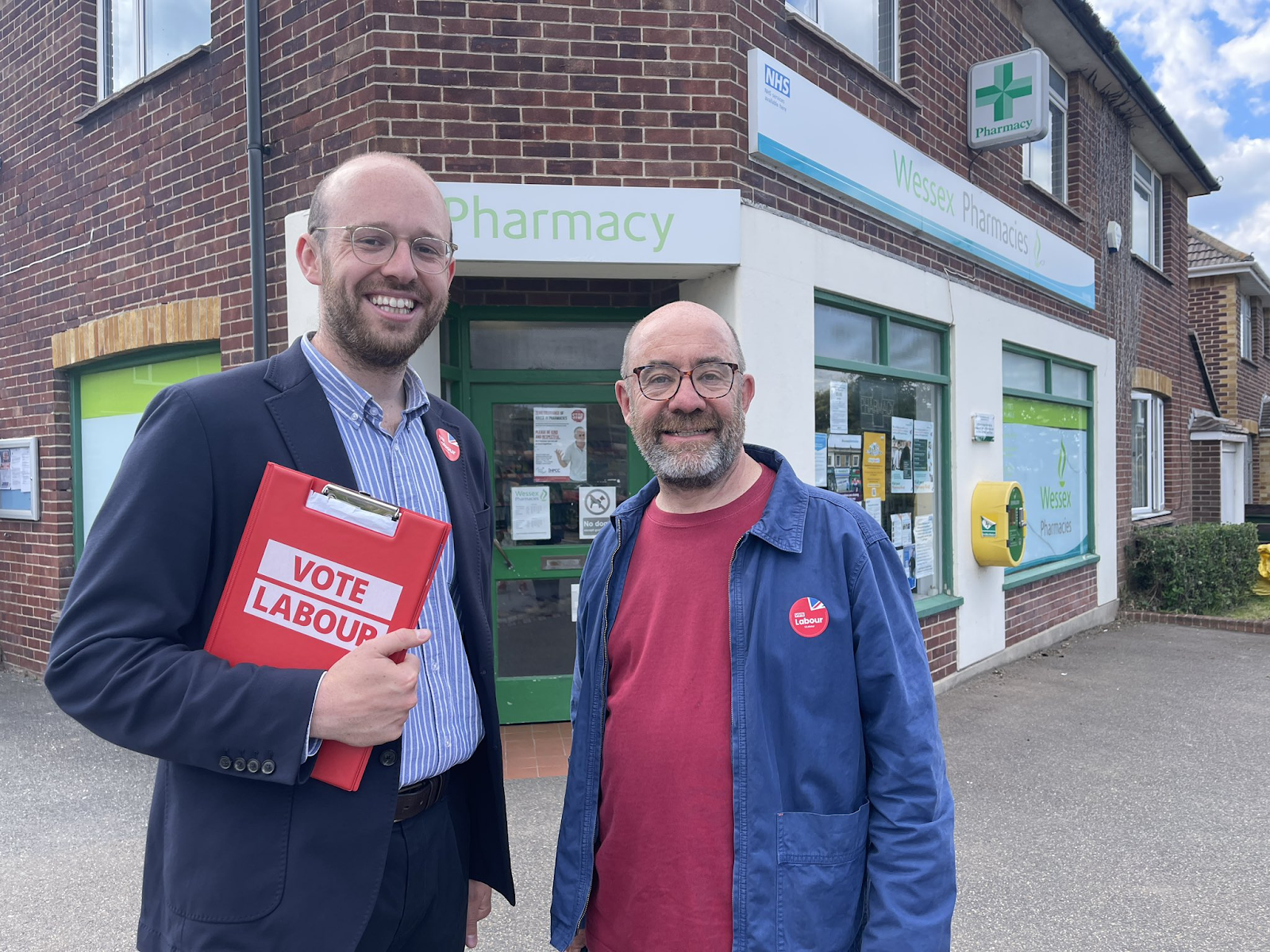
Hatton also sees an advantage in his seat’s electoral past, with South Dorset’s time represented by Labour MPs setting it apart from other constituencies in the county. He highlights the strong name recognition locally for Jim Knight – the Labour peer who was the seat’s MP for much of the New Labour era – despite 14 years having passed since he left office.
READ MORE: ‘How can I help Labour this election? The party insider’s guide to campaigning’
None of the three candidates paint a rosy picture for the Conservatives in their area.
Hatton tells me of a “real sense of betrayal among traditional Tory voters”, while Aldridge says he has been “really surprised at how many people are so angry and furious” with their party. “The anger against the Tories is visceral,” Norris says. “I’ve never known anything like it in my adult lifetime, politically.”
‘A Labour government saved my brother’s life’
Local-ness is a theme of the canvassing sessions in South Dorset and Weston-super-Mare, with both candidates quizzed by voters about whether they are from the local area. Aldridge, like Hatton, has strong local ties to the constituency he is seeking to represent, as a local resident who moved to the area with his family when he was a teenager.
He says the fact he is local has cut through on the doorstep and identifies it as a factor in this election being the “best chance” Labour has ever had to take the seat.
READ MORE: Labour wants a new generation of new towns. Can it win in Milton Keynes?
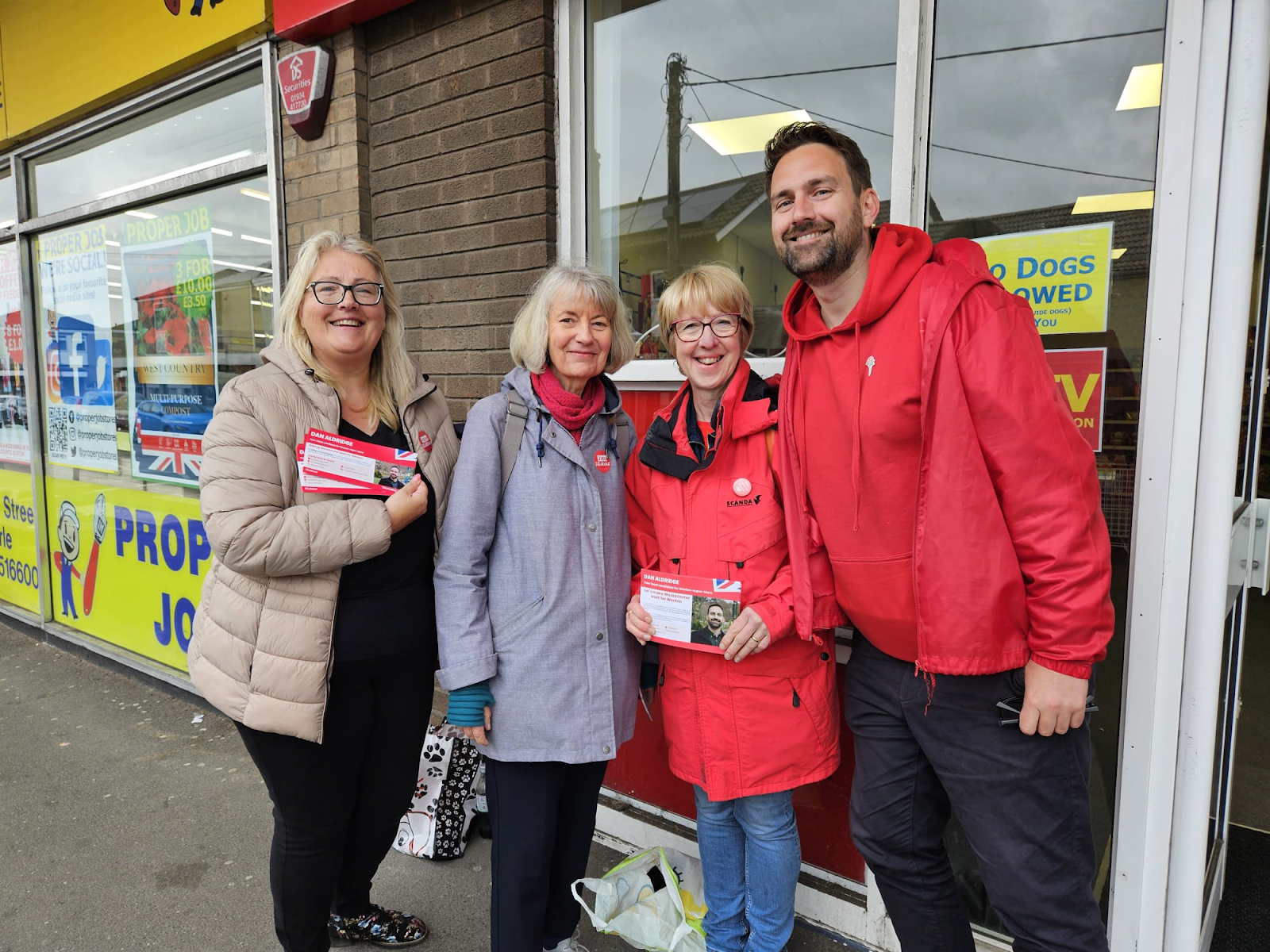
Aldridge – who works as head of policy for BCS, the Chartered Institute for IT – has a moving personal story of the impact of the last Labour government on his life. He was part of a foster family growing up and highlights the changed approach to social services under New Labour.
“I genuinely believe that the Labour government saved my brother’s life,” he tells me, saying his brother was in a “very difficult situation” and social services “saved him”. Aldridge also cites Labour’s repeal of Section 28 as a “massive awakening” for him politically.
But he does express concern that some people “have forgotten what a transformative power a Labour government can have” and tar all parties with the same brush.
“There’s a real worry that people will turn away from a credible Labour Party, because they can’t really remember what it’s like,” he says, particularly highlighting younger voters. “I’m hoping that once Labour – touch wood – wins, we get to demonstrate that transformative power.”
‘It’s positive – but we’re fighting like we’re 20 points behind’
Aldridge tells me that, regardless of the result, he wants Labour to be more active locally in Weston going forward and canvassing more regularly. He attributes the party’s emergence as the main challenger to the Tories to a combination of factors including the hard work of volunteers and local councillors and the efforts of his predecessor as the parliamentary candidate, Tim Taylor, who came second on three occasions. He also describes the boundary changes the seat has seen as a “huge influencing factor”, taking out a number of the “very Tory areas”.

Hatton tells me the activeness of South Dorset Constituency Labour Party enabled his campaign to hit the ground running, with the local party setting ambitious contact-rate targets even outside election time.
He gives a hopeful assessment of his chances come polling day, telling me he thinks it will be the closest result since he was in primary school: “I don’t know exactly what’s going to happen. But it feels really positive. I think the Tory majority will tumble.”
READ MORE: ‘The manifesto’s not perfect, but at the launch you could feel change is coming’
Aldridge goes for the party favourite of “confident not complacent” when asked about his expectations, a sentiment echoed by Norris who describes his campaign as “much more positive” than any other campaign he has done. But Norris adds: “What I don’t want is people to get ahead of themselves. We’re fighting this seat like we’re 20 points behind. We’re going to continue to do that.
“And when we win, hopefully, we can be pleasantly surprised because our mindset will have been that we needed to fight for every vote.”
‘Go out and campaign. Go to your marginal seats’
Success in any of these seats would show the broadness of the coalition of voters backing Labour at this election, taking seats the party has not held since the New Labour era – and, in the case of Weston, not even then.
The projections of Tory wipeout in recent MRP analyses may have become increasingly unbelievable, but what has been notable in some polling has been the number of seats deemed ‘too close to call’. One seat here or there may not seem like much in the context of a Labour majority government, but it could make a huge difference to individual communities.
Hatton puts it best in a direct appeal to LabourList readers: “Go out and campaign. Go to your marginal seats. There are so many seats that might change hands at this election. If you’re watching this election thinking this is the most exciting election of my lifetime, go and be part of it.”
Read more of our 2024 general election coverage:
Labour wants a new generation of new towns. Can it win in Milton Keynes?
2024 manifesto versus 1997: ‘There are big similarities, but big differences’
‘How can I help Labour this election? The party insider’s guide to campaigning’
Revealed: The battlegrounds attracting most activists as 17,000 sign up
SHARE: If you have anything to share that we should be looking into or publishing about this story – or any other topic involving Labour or the election – contact us (strictly anonymously if you wish) at [email protected].
SUBSCRIBE: Sign up to LabourList’s morning email here for the best briefing on everything Labour, every weekday morning.
DONATE: If you value our work, please donate to become one of our supporters here and help sustain and expand our coverage.
PARTNER: If you or your organisation might be interested in partnering with us on sponsored events or content, email [email protected].




More from LabourList
Government abandons plans to delay 30 local elections in England
‘The cost of living crisis is still Britain’s defining political challenge’
‘Nurses are finally getting the recognition they deserve’